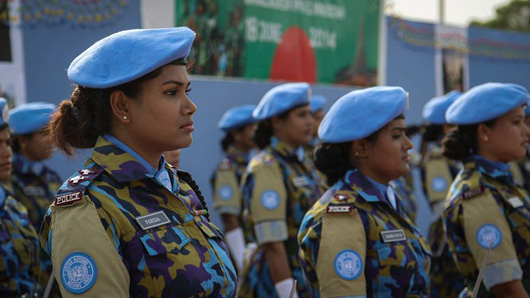
TORONTO – Three new films from Palestine premiered at the Toronto International Film Festival this October. 3000 Nights is a brilliant metaphor for the people’s resistance under the brutal ongoing Israeli Occupation. A young pregnant woman is arrested for no apparent reason, imprisoned without being charged, and locked up for 3000 days, forced to give birth behind bars. But the community of women prisoners organize and rebel against the inhuman prison system in a fiction film that is too close to the tragic realities facing Palestinians today.
Dégradé is the feature debut of twin brothers born in Gaza, Arab and Tarzan Nasser, and stars an audacious ensemble of women trapped in a beauty salon while guns are blazing right outside the door, a fiction film also not far from the reality of Gaza. (A full review will be forthcoming in coverage of the Chicago Film Festival).
And a third film that is also not far from the realities of Gaza is The Idol, the latest film from Oscar-nominated Palestinian director Hany Abu-Assad (Paradise Now, Omar). It’s an uplifting and heartwarming true story about triumph over extreme adversity. All of Abu-Assad’s films address the suffocating effects of the Israeli Occupation of Palestinian land, but this story approaches from another direction, bringing a sense of hope and victory and should appeal to a wider audience.
Sharing the joys of a Slumdog Millionaire and the popular appeal of TV’s American Idol and its offspring around the world (the director admits to never having watched these type shows), The Idol reaches ecstatic heights.Mohammad Assaf, a 22-year-old wedding singer from Gaza, is played by two actors throughout the course of the film, and both are charming and believable. An unlikely candidate for the hugely popular Arab Idol TV show broadcast from Beirut with auditions in Egypt, Assaf realizes it’s almost impossible to get out of Gaza, let alone to Egypt and Lebanon. Without a visa, with opposition from the fundamentalist government and police who consider contests like this decadent, and with barely any money, Assaf almost surrenders despite the urging of his friends and family. But through a string of circumstances, with help from his friends in getting inside help dodging the fundamentalists, luck at the border crossing and overcoming other seemingly insurmountable obstacles, he actually makes it to the auditions. Finding out that he has arrived too late for the auditions, he climbs the hotel roof in Cairo and is discovered, while singing in the bathroom, by another astounded applicant who gives him his place in line.
The real-life Assaf has a gifted voice. When he sings, all hearts are moved, sensing his voice embodying the struggle of his people. Assaf had actually been considered to play himself in the movie, but the selected actors couldn’t have done better, capturing the honesty and humility of this natural singer. Assaf now has two new hit songs and tours worldwide as a UN Goodwill Ambassador while spreading the message of peace and understanding for Arabic culture.
Director Abu-Assad said his other political dramas left him frustrated and disheartened, but this one was a pleasure. Professional film crews ventured into Gaza for the first time in over 30 years. He reacted to what they saw: “You won’t believe the amount of destruction there. I just can’t believe that humanity’s allowing these kinds of crimes.”
This is a rare and joyous telling of the Palestinian reality, along with The Wanted 18, that needs to be seen by the world.
And now from Bangladesh…
The small country of Bangladesh, the poorest nation in Asia, is the location for a couple of interesting films shown at TIFF. Meghmallar is a drama that recreates the time leading up to the 1971 Bangladesh War of Liberation from Pakistan. It’s a low-budget minimalist film, but with an assured sense of the history and people. It follows the story of a chemistry teacher who accidentally gets misidentified as a rebel fighter, while all the villagers are forced to make fateful decisions in the advancing struggle. This first feature from Zahidur Anjan promises a new voice in Asian cinema, telling a tale that is rarely heard or properly understood, addressing the meaning of nationalism and patriotism and its complex relation to love and family.
Journey of a Thousand Miles: Peacekeepers is directed by two women, an American and Pakistani, and takes place mostly in Haiti, but it’s all about several young inexperienced Bangladeshi policewomen who are hired by a UN agency to assist for a full year in the devastated regions of Haiti after the 2010 earthquake. The task is far beyond the capacity of these young untrained women, many of whom had never left their country, let alone their families, for a term as long as this. The film could be a lesson on how not to send aid to a needy country. Untrained in the necessary police functions, the history of the country and the language of the people, but simply driven by the desire to give assistance when needed(for a decent salary), these altruistic workers run into one obstacle after another. The UN has been suspected of bringing the cholera epidemic. They have overstayed their welcome as the people want them out. Violence and misunderstanding confront these Muslim women who seem like fish out of water. Their homesickness aside, they can’t wait to return to the security of their homeland. They manage to get out alive, and their husbands and children are waiting anxiously at the airport upon their arrival, hoping they’ll never choose an adventure like this again.
And from China…
The largest Asian nation, with one of the fastest growing economies in the world, China also has one of the world’s largest and quickly expanding film industries. With TIFF presenting no fewer than seven new brilliant features, viewers had a chance to see many stunning aspects of this burgeoning culture. Many themes are addressed, like the trend of today’s Chinese youth who are choosing the excitement and vitality of big city life over the traditional countryside (A Promised Land); the Tibetan spiritual quest (Paths of the Soul); the changing landscape of the gangster underbelly of Beijing (Mr. Six); the effects of the economic boom and materialism on family and traditional life (Mountains May Depart); a song and dance musical about corporate corruption and the burgeoning class of wealth (Office).
One of the most elaborate productions is an epic about Jackie Chan’s parents than spans several epochs in Chinese history. A Tale of Three Cities is a stunning cinematic testament to the power of love overcoming social upheaval and tremendous hardships. From the war with Japan in the 1930s through WWII, the formation of Mao’s Communist China, the Cultural Revolution and mainland versus Hong Kong, the film pulses with life and drama, utilizing the massive resources of film production and labor available in a country that does everything big.
But there is also one small film from China that stands out from the rest in its simplicity and effect. The concept of “patriotism” is challenged in a probing study of a young high school advocate of Mao’s Communist China. One of the more progressive themed films from the giant Asian country, it covers five years in the life of a young man who is consumed and amazed by the accomplishments of his country’s hero, Chairman Mao Tse Tung. A Young Patriot opens with scenes of paintings and statues of Mao that are prevalent all around China, and then follows Zhao Chantong as he eagerly waves a large red flag leading a small parade down the streets of his village.
It’s hard to tell how people are reacting to this young man’s zeal, if they support his idealism or consider him eccentric. But his beliefs are sincere, and his innocent charm is appealing. He has support and comfort from his family and friends, but apparently is failing in his high school studies. He is forced to work the summer as a hotel valet in order to retake some classes and finally graduate to a community college. Zhao is zealous in his drive to spread the word of Mao in a country that is quickly forgetting its history. He sees patriotism as a virtue, and it becomes his own personal pursuit. His dedication to family is shown in his futile attempts to save his grandfather’s house from demolition, by standing on the roof as the machines tear into the walls.
He sings patriotic songs of the Mao era with his whole heart, containing lyrics such as: “Beijing’s Golden Mountain shines with brilliance, Chairman Mao is that golden sun. Its warmth and kindness light up this heart of a slave.”
Zhao’s military service is complicated, as he discovers few have the same dedication as he has for Mao’s teachings. And the changing economic landscape of a fast growing country is producing systemic greed and corruption that are hard for him to accept. The film ends with him walking through a tunnel coming out into the light, walking past a giant advertisement sign that reads, “Agricultural Credit Union would like to be the bridge…for thousands of families towards enrichment.” And while the credits roll, there’s a scene of a large white statue with its head covered in red material, most likely meeting a fate similar to Lenin’s statues in the former Soviet Union.
Photo: “Journey of a Thousand Miles: Peacekeepers” | Official Facebook page












Comments